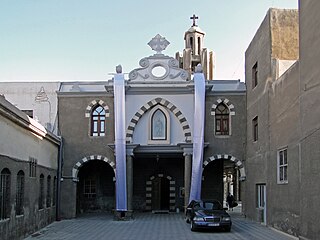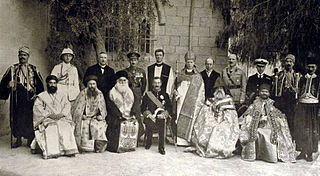This is the list of cathedrals in the State of Palestine , sorted by denomination.
Contents
- Status quo
- Catholic Church
- Eastern Orthodox
- Oriental Orthodox
- Anglican
- See also
- References
- Jerusalem

This is the list of cathedrals in the State of Palestine , sorted by denomination.

Cathedrals of the Catholic Church in Palestine: [1]
Eastern Orthodox cathedrals in Palestine:
Oriental Orthodox cathedrals in Palestine:
Anglican Cathedrals in Palestine:

Eastern Christianity comprises Christian traditions and church families that originally developed during classical and late antiquity in Western Asia, Asia Minor, Eastern Europe, Southeastern Europe, the Caucasus, Northeast Africa, the Fertile Crescent and the Malabar coast of South Asia, and ephemerally parts of Persia, Central Asia and the Far East. The term does not describe a single communion or religious denomination.

Patriarchate is an ecclesiological term in Christianity, designating the office and jurisdiction of an ecclesiastical patriarch. According to Christian tradition three patriarchates were established by the apostles as apostolic sees in the 1st century: Rome, Antioch, and Alexandria. Constantinople was added in the 4th century and Jerusalem in the 5th century. Eventually, together, these five were recognised as the pentarchy by the Council of Chalcedon in 451.

The Syriac Catholic Church is an Eastern Catholic Christian jurisdiction originating in the Levant that uses the West Syriac Rite liturgy and has many practices and rites in common with the Syriac Orthodox Church. Being one of the twenty-three Eastern Catholic Churches, the Syriac Catholic Church is a self-governed sui iuris particular church, while it is in full communion with the Holy See and with the entirety of the Roman Catholic Church.

An exarch was the holder of any of various historical offices, some of them being political or military and others being ecclesiastical.

The Greek Orthodox Patriarchate of Antioch, also known as the Antiochian Orthodox Church and legally as the RūmOrthodox Patriarchate of Antioch and All the East, is an autocephalous Greek Orthodox church within the wider communion of Eastern Orthodox Christianity that originates from the historical Church of Antioch. Headed by the Greek Orthodox patriarch of Antioch, it considers itself the successor to the Christian community founded in Antioch by the Apostles Peter and Paul. It is one of the largest Christian denominations of the Middle East, alongside the Copts of Egypt and the Maronites of Lebanon.

The term Melkite, also written Melchite, refers to various Eastern Christian churches of the Byzantine Rite and their members originating in West Asia. The term comes from the common Central Semitic root m-l-k, meaning "royal", referring to the loyalty to the Byzantine emperor. The term acquired religious connotations as denominational designation for those Christians who accepted imperial religious policies, based on Christological resolutions of the Council of Chalcedon (451).

Alphabetical list of Eastern Christianity-related articles on English Wikipedia

The West Syriac Rite, also called the Syro-Antiochian Rite and the West Syrian Rite, is an Eastern Christian liturgical rite that employs the Divine Liturgy of Saint James in the West Syriac dialect. It is practised in the Maronite Church, the Syriac Orthodox Church, the Syriac Catholic Church and various Malankara Churches of India. It is one of two main liturgical rites of Syriac Christianity, the other being the East Syriac Rite. It originated in the ancient Patriarchate of Antioch. It has more anaphoras than any other rite.

Antiochene Rite also known as Antiochian Rite refers to the family of liturgies originally used by the patriarch of Antioch.

The Catholic Church in Israel is part of the worldwide Catholic Church, in full communion with the Holy See in Rome. The Catholic Church in Israel is divided into three main jurisdictions: the Latin Patriarchate of Jerusalem, the Franciscan Custody of the Holy Land, and the Salesian Mission. Each of these jurisdictions has its own responsibilities and areas of operation.

Christianity in Lebanon has a long and continuous history. Biblical Scriptures show that Peter and Paul evangelized the Phoenicians, whom they affiliated to the ancient Patriarchate of Antioch. Christianity spread slowly in Lebanon due to pagans who resisted conversion, but it ultimately spread throughout the country. Even after centuries of Muslim rule, it remains the dominant faith of the Mount Lebanon region and has substantial communities elsewhere.

The Christian Quarter is one of the four quarters of the walled Old City of Jerusalem, the other three being the Jewish Quarter, the Muslim Quarter and the Armenian Quarter. The Christian Quarter is situated in the northwestern corner of the Old City, extending from the New Gate in the north, along the western wall of the Old City as far as the Jaffa Gate, along the Jaffa Gate - Western Wall route in the south, bordering on the Jewish and Armenian Quarters, as far as the Damascus Gate in the east, where it borders on the Muslim Quarter.
In Christianity, the concept of an Apostolic Throne refers to one of the historic Patriarchates that was associated with a specific apostle. Not all of the apostles are associated with specific "thrones"; in general, the phrase applies to Apostles that presided over a specific geographic church. Notably, there is no apostolic throne associated with St. Paul, who along with St. Peter was present, at different times, in both Antioch and Rome. The phrase is also somewhat interchangeable with the "Apostolic See".

The Armenian Quarter is one of the four sectors of the walled Old City of Jerusalem. Located in the southwestern corner of the Old City, it can be accessed through the Zion Gate and Jaffa Gate. It occupies an area of 0.126 km², which is 14% of the Old City's total. In 2007, it had a population of 2,424. In both criteria, it is comparable to the Jewish Quarter. The Armenian Quarter is separated from the Christian Quarter by David Street and from the Jewish Quarter by Habad Street.

The Maronite Catholic Patriarchate of Antioch is the seat of the Patriarch of the Maronite Church. It is currently governed by the Patriarch Cardinal Bechara Boutros al-Rahi, OMM.

The Holy Qurobo or Holy Qurbono refers to the Eucharist as celebrated in Syro-Antiochene Rite and the liturgical books containing rubrics for its celebration. West Syriac Rite includes various descendants of the Oriental Orthodox and Eastern Catholic churches. It consists of two distinct liturgical traditions: the Maronite Rite, and the Jacobite Rite. The major Anaphora of both the traditions is the Divine Liturgy of Saint James in Syriac language. The Churches are primarily based in the Middle East, Africa, and India.

The Holy and Ancient Archdiocese of Jerusalem, All Palestine, and All the Near East or the Coptic Orthodox Patriarchate in Jerusalem, is a Metropolitan Archdiocese of the Coptic Orthodox Church, which is part of the wider communion of the Oriental Orthodox Church. It is headed by the Coptic Orthodox Metropolitan Archbishop of Jerusalem, the incumbent being Metropolitan Archbishop Antonious of Jerusalem since 2016. Its jurisdiction covers those Coptic Orthodox Christians living in the Near East; with churches and monasteries in the State of Israel, State of Palestine, the State of Kuwait, the Hashemite Kingdom of Jordan, the Lebanese Republic, the Syrian Arab Republic, and the Republic of Iraq. The adherents are largely of Coptic Egyptian descent, mainland Coptic migrants and their descendants. The archdiocese is based at St Anthony's Monastery, in the Christian Quarter of the Old City of Jerusalem, beside the Church of the Holy Sepulchre.
